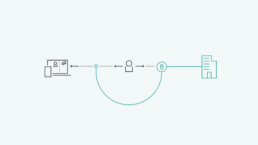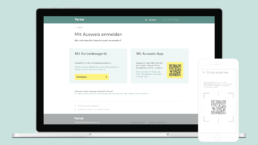New ways to interact with government
Today, interacting with government agencies often comes along with visiting the local office—long waits included. Compelling online offerings that provide more than just basic information are still sparse in the German public sector and, if available at all, rarely used due to their poor usability.
Based on an in-depth analysis of the current citizen experience in Germany, the project E-Gov 2025 presents four related concepts illustrating how citizens could interact with government online and in a user-centered way.
The first conceptual unit, called D-Portal, bundles all government information and service offerings in one place, regardless of regulatory jurisdiction and federal level. Combined with three additional conceptual units, D-System, D-ID and D-Assist, the current work paves the way for an attractive and efficient e-government that is familiar, trustworthy, quick and convenient.
I was awarded Best Graduate 2016 by the University of Applied Sciences Potsdam for this bachelor thesis.
The citizen experience today
When interacting with online government services, citizens usually pass through the following four phases:
1
Become aware of the interaction with government
2
Seek and find information
3
Use an online public service
4
Follow up and document
Along this way, citizens face a plethora of obstacles that, in total, result in a poor usability of today’s online public services. Overall, the citizen journey can be characterized as:
Unfamiliar
Citizens interact with government services comparatively rarely (only about twice a year).
Tedious
Citizens can’t get rid of some civil duties – such as their income statement.
Delicate
Citizens need to provide sensitive personal data, for example when being on welfare.
Complicated
Citizens, at least most of them, have difficulty understanding legal jargon.
The citizen experience tomorrow
The following four concepts pave the way for an attractive and efficient e-government that is familiar, trustworthy, quick and convenient.
Familiar
The D-Portal bundles government services and information, regardless of regulatory jurisdiction and federal level. It’s the citizens‘ one-stop-shop for dealing with government.
Trustworthy
The D-ID secures the access to personal data. Citizens can choose their D-ID provider from a variety of private and trustworthy institutions, such as banks or insurance companies.
Quick
The D-System connects authorities with private companies in a safe and reliable manner and regulates data exchange with a comprehensive rights management.
Convenient
D-Assist approaches citizens with different options to choose from when their action is legally required or possible. After decision-making, the assistant also takes care of all necessary processes.
E Government 2025 in action
The following two scenarios demonstrate how citizens interact with government online and in a user-centered way. Scenario 1 focuses on leaving the church. Scenario 2 shows how citizens give their consent to a data exchange among public authorities after a D-Portal notification via e-mail or text message.


















